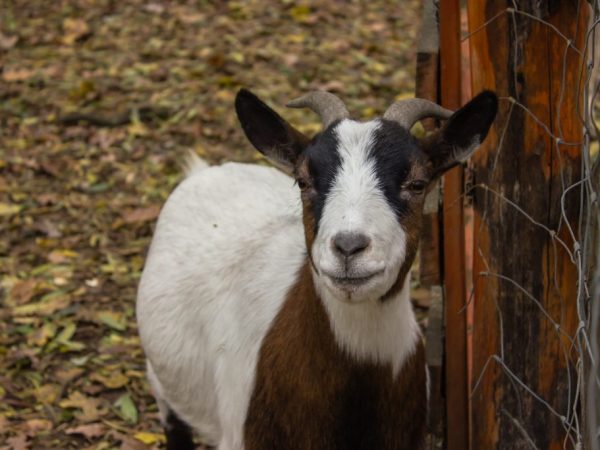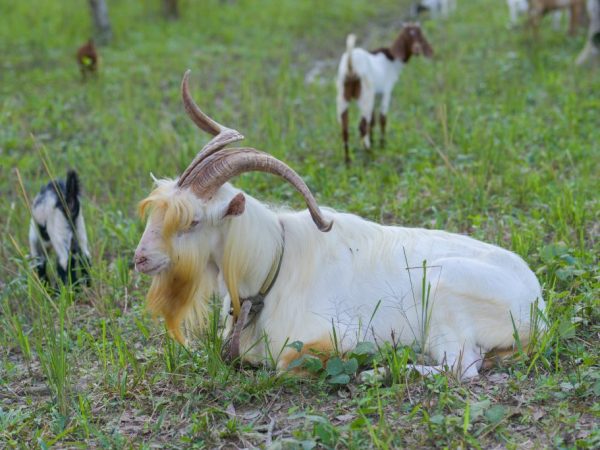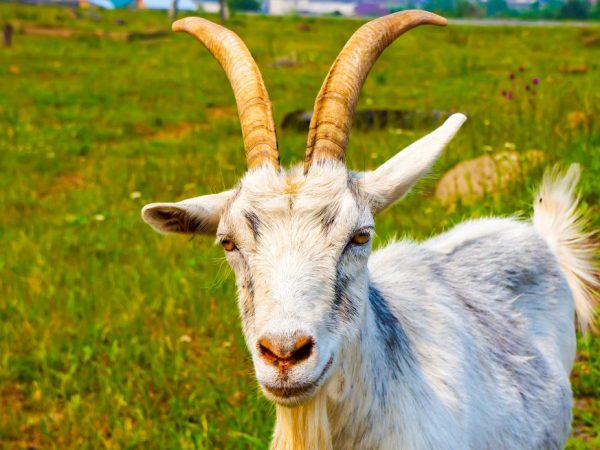Treatment of diarrhea in a goat at home
Goat diarrhea is one of the few problems that farmers face the most. Farmers are wondering what causes a goat to vilify? A goat is a rather unpretentious animal, rarely gets sick with proper care. However, an experienced livestock breeder should be aware of possible diseases and be able to diagnose malaise in time. Basically, young animals suffer from such a disease, when watery feces of light yellow color with a putrid odor involuntarily come out of the intestines.

Treatment of diarrhea in a goat at home
Diarrhea is a serious ailment, as it causes dehydration of the body and can even threaten the life of an individual. If a goat has diarrhea, then you need to immediately take action and treat the animal. The farmer should know how to treat diarrhea in kids and adults. If the goat had diarrhea once and immediately passed, then this may be a reaction to indigestion, but if the goat has prolonged diarrhea, then this may indicate an infection of the animal's body.
Basically, any causes of diarrhea are most often the result of improper care and lack of hygienic cleanliness in the room. As a preventive measure, the pen should be treated with special disinfectants. If the goat gets dirty in its feces, then they need to be washed off, and the animal should be washed with warm water. It is recommended to give drinking water only boiled and at room temperature.
Possible causes of diarrhea in young animals
In young goats, diarrhea can begin at any time, or even in several months, and it is this ailment that has the most serious consequences. Severe dehydration of a fragile body, coupled with the loss of vital trace elements for the baby, can lead to negative consequences. The causes of the disorder can be both feeding the mother inappropriate food during pregnancy, and feeding the baby itself with dirty colostrum. Young animals become infected with diarrhea from a sick mother (if an infection has occurred). Also, young animals can catch a cold due to violations of the temperature regime in the place of their detention, in addition, parasites can cause diarrhea.
Occasionally, diarrhea can also indicate the presence of a congenital pathology of the gastrointestinal tract. How to recognize diarrhea? First of all, the sick cub stops sucking the mother's udder, becomes lethargic. You can observe bloating, an increase in body temperature, and of course, the consistency of feces changes - it becomes liquid with a pungent putrid odor, acquires a yellow, gray or even tarry color, depending on the cause of the disease. In addition, mucus or even blood streaks often appear in the feces. In the presence of these symptoms, it is worth responding immediately to avoid the progression of the disease.
Causes of diarrhea in adults
Diarrhea in adults sometimes indicates a serious illness. Although the cause may be a simple excess of protein feed and concentrates, an imbalance in the diet or an abrupt transition to new types of feed, there are often more serious factors. For example, poisoning with poisonous grasses, moldy hay, or chemicals in feed.
Also, colds, infections or parasites can be the cause. It is worth paying attention to the conditions of keeping animals, since dirty, damp bedding or insufficient care of the animal itself can also become the cause of discomfort. Check if all the requirements for the animal housing are met.
Symptoms of diarrhea in goats

All diseases are cured
It is important to recognize the symptoms in time, correctly determine the cause and choose an effective treatment. A healthy individual has a good appetite, it is active, calm, the stool is shaped like soft peas, and the process of defecation does not cause discomfort. Therefore, if a goat begins to refuse food, drinks too much, seems depressed, lethargic, her temperature rises or falls, breathing becomes difficult, the quality and quantity of feces changes, palpation of the abdominal cavity causes obvious pain, it is worth talking about the presence of serious pathology. Diarrhea is more likely to affect young individuals, but this trouble happens with adults, strong animals.
Diarrhea is not uncommon in young animals. To avoid this, it is necessary to carefully monitor in advance that the conditions where the pregnant goats live, in which lambing occurs and the newborn kids are located, comply with all sanitary and hygienic standards, including the temperature and climatic regime. So you can protect the offspring from the effects of the pathogenic environment, cold, infections, exclude possible diseases in the expectant mother.
The main manifestation of diarrhea is loose stools with a pungent odor. You can often also observe after bloating, increased body temperature, impaired coordination of movements, cramps in the limbs, decrease or disappearance of milk during milk production. The kids have a lack of appetite. The animal rapidly loses weight, weakens, stops eating, drinks a lot and greedily. Dehydration and loss of nutrients necessary for the life of the body along with the liquid can lead to sad consequences, therefore, at the first symptoms of diarrhea in livestock, it is important to immediately start high-quality treatment.
Helminths in a goat
The presence of parasites can also cause intestinal upset. Goats can become infected with worms through the larvae of the food parasites. As soon as the larva in the body of an infected animal turns into an adult worm, eggs begin to be released through the feces to infect new individuals. What to do and how to stop further infection? To prevent the massive spread of helminthiasis, you can maintain proper cleanliness in the room, carefully carry out planned measures for the treatment of animals and preventive deworming.
If the baby goat has carried it, then you can carry out treatment with folk remedies so as not to injure the fragile body. At home, diarrhea can be left in a goat by various means, but if the female gives milk, then you can try to cure her as well as the young with folk remedies, and if it does not help, then you will have to give antibiotics. All instructions prescribed by your veterinarian must be followed. It is also necessary to give food, even if the goat has no appetite.
Choosing the right food for goats
Since goats are quite unpretentious in food, many livestock breeders do not pay enough attention to this issue. However, the health of livestock directly depends on the quality and quantity of feed.It is necessary to pay special attention to the observance of feed storage standards in order to avoid being affected by all kinds of fungi that emit toxic substances, and to prevent putrefactive processes. If there is a suspicion of spoilage of feed, in no case should it be given to animals. Poisoning can also occur with frequent feeding of cattle with oil cake, which causes disorders in the gastrointestinal tract.
Long-term feeding of animals with protein hay and concentrates changes the acidity of the gastrointestinal environment, contributes to the replacement of healthy microflora with pathogenic ones and the development of putrefactive processes. The use of compound feed is undesirable, since it clogs the intestines and also causes disorders.
It is important to consider when choosing food, its quantity and characteristics, the sex of the animal, age and physical condition. Before giving the next portion to the goats, you must not be lazy and check its quality, the absence of mold stains and a musty smell. Although goats gladly eat cabbage, juicy roots (beets, potatoes), fresh green grass, it is worth feeding such feeds with caution, so as not to exceed the optimal ratio with dry feed and not cause diarrhea in young animals. However, the diet should be varied and carefully balanced.
Treating diarrhea in animals
If diarrhea occurs in domestic kids, what is the best treatment? It is worth remembering that the cause of diarrhea is not always poisoning or non-compliance with sanitary standards for keeping animals, so the first step is to isolate sick individuals in order to prevent the spread of a possible infection. You also need to give more water and medications prescribed by your veterinarian. In the case of newborn kids, it is necessary to treat the disorder especially carefully, since the fragile body most of all needs quick and intensive treatment. Delay or neglect of symptoms can lead to the death of diseased individuals.
First of all, the kids need to be isolated. Within 5-10 hours, goats should be on a diet and at this time do not give the usual products, due to which infection or indigestion may have occurred. It is recommended to give a drink with a warm saline solution, starch, rice broth or bird cherry broth (they contain tannins that slow down intestinal motility, suppress the activity of pathogens, and give an anti-inflammatory and restorative effect). Diarrhea in kids and its treatment is as follows: Give a drink every 3-4 hours, 200-250 ml with a small addition of milk to replenish energy.

Drinking plenty of fluids will not hurt
Treatment with antibiotics and folk remedies
Make sure the goat does not lose too much fluid. If the diarrhea lasts for a long time, antibiotics are prescribed to the animals. Such medicines are given according to the instructions, usually within 5 days. This period is enough to overcome the symptoms of the disease. As soon as the condition improves markedly, the babies can be launched back to the female. An adult animal is shown the same measures, a decoction of rice or bird cherry berries is especially good. This broth should be thoroughly strained before giving to the animal to drink.
If diarrhea in a goat and antibiotic treatment does not work, you should try to give a decoction of oak bark. Give a sick animal 50-60 ml 3 times a day. If the nature of the diarrhea is infectious or parasitic, it is especially important to isolate diseased individuals. The use of antibiotics is shown, for example Levomycetin. The dosage should be checked with your veterinarian. In general, before embarking on treatment on your own, it is worth consulting an experienced doctor who can establish the causes of the disease and choose the optimal treatment regimen based on the characteristics, age and sex of the animal.
Infectious causes
Colibacillosis and salmonellosis are often found in young animals, such diseases can occur in an acute form, can be observed already in an individual of one day of age, there is a high risk of mass infection. Features of the course of the disease are as follows:
- Body temperature 41 degrees.
- Convulsions, paralysis.
- Feces frothy with blood, urine with blood.
- Dehydration.
After successful recovery, the individual becomes active and subsequent vaccination is possible as directed by the veterinarian. For treatment, antitoxic serum, antibiotics and sulfa drugs are usually used. Infection with this dangerous disease is possible both through direct contact with a sick animal, and by airborne droplets.
Specific therapy: a sick animal is given immune serum, and a course of antibiotic treatment is carried out. Additional symptomatic treatment is also required, which should be prescribed by a veterinarian. Salmonellosis can usually be identified by the presence of white mucous membranes and blood clots in the stool of an affected animal. It is dangerous if a pregnant individual falls ill, since the disease can provoke an abortion.
Does diarrhea affect the quantity and quality of milk?
Due to the severe disruption of the body's fluid balance during diarrhea, milk volume is primarily reduced. It is possible that the baby goat will not get breast milk when feeding. If the goat is vilified and it is even incomprehensible from what, then something needs to be done, otherwise the young will remain hungry. Also, other factors affect the quality of milk - pathogens can be introduced into the udder during milking, and thus, the milk will become unsuitable for feeding the kids and for eating raw.
However, such milk can be boiled and used, for example, for making cheeses or cottage cheese. In its raw form, milk is allowed to be drunk only after the goat is confident in the complete recovery. By following the simple rules for caring for and feeding a goat, you can be sure that the chances of a goat developing diarrhea are minimal.


